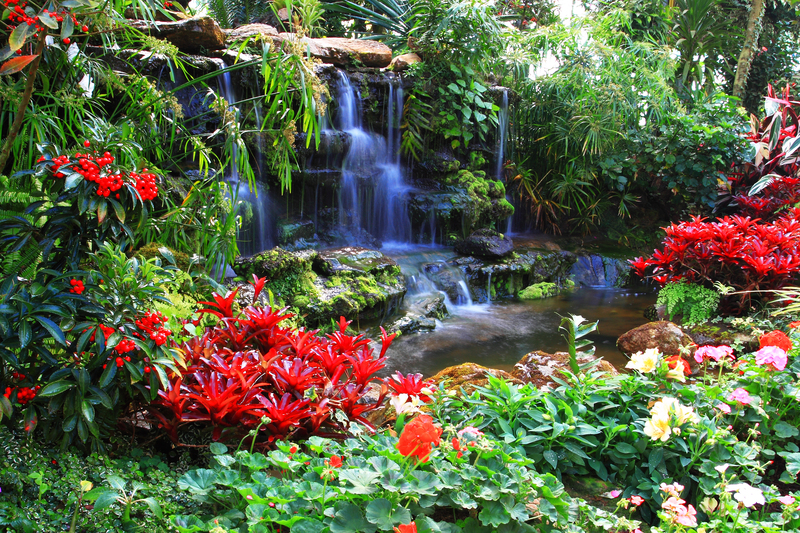Initiate the Restoration: Revamp Your Garden
Posted on 24/08/2025
Initiate the Restoration: Revamp Your Garden for a Lush, Vibrant Outdoor Retreat
Are you dreaming of turning your outdated, unloved backyard into a sanctuary brimming with beauty and life? Initiate the restoration and revamp your garden to create a thriving outdoor space! Whether you have a compact urban patio or a sprawling cottage yard, a thoughtful garden makeover can transform your environment and elevate your quality of life.
Why You Should Revamp Your Garden
With increasing time spent at home, your garden or backyard becomes a vital extension of your living area. Revamping your garden not only boosts aesthetic appeal but also adds significant value to your property. Here's why restoring your garden is a wise investment:
- Enhances curb appeal and property value
- Promotes well-being through access to green spaces
- Encourages outdoor activities and social gatherings
- Supports biodiversity and environmental health
- Contributes to sustainable living by enabling homegrown food
Ready to give your garden a new lease on life? Let's explore the step-by-step approach to reviving and rejuvenating any outdoor haven.

Step 1: Assess and Plan Your Garden Transformation
Conduct a Thorough Site Assessment
Before you initiate the restoration of your garden, observe the current state of your landscape:
- Identify strengths such as mature trees, existing flower beds, or charming pathways
- Note problems like poor drainage, overgrown areas, pest infestations, or damaged features
- Analyze sun and shade patterns, soil composition, and prevalent microclimates
- Take measurements and sketch out your available space
Define Your Restoration Goals
What do you want to achieve with your revamped garden? Consider these aims:
- Attracting pollinators for a vibrant ecosystem
- Entertaining guests with patios and seating areas
- Creating child-friendly play spaces
- Growing vegetables and herbs
- Designing a low-maintenance retreat
Jot down your vision and priorities. This vision will inspire your garden rejuvenation from concept to completion!
Step 2: Clean, Declutter, and Prepare the Land
Clear the Way for Renewal
To initiate the restoration, start with a clean slate:
- Remove litter, broken containers, dead plants, and debris
- Prune overgrown shrubs and trees, removing diseased or damaged branches
- Pull weeds and eradicate persistent invasive species
- Edge out borders for beds and pathways
Tip: Rent or borrow garden tools for larger tasks, or hire help if needed for tree pruning or heavy lifting.
Revitalize the Soil
The foundation of any lush garden is healthy soil. After clearing, take these steps:
- Test your soil for pH level and nutrient content (available at garden centers)
- Add organic matter like compost or well-rotted manure to improve structure and fertility
- Aerate compacted areas with a garden fork
- Apply mulch to suppress weeds and retain moisture
Nourished soil accelerates plant establishment and resilience for your upcoming garden restoration.
Step 3: Design and Structure Your Rejuvenated Garden
Choose a Garden Style
When planning a garden renovation, consider a theme that aligns with your home's architecture and your personal tastes. Some popular styles include:
- Cottage gardens - Overflowing with flowers and informal pathways
- Modern minimalism - Simple lines, geometric planting, and sleek furniture
- Formal symmetry - Structured topiaries, manicured lawns, and gravel paths
- Wildlife-friendly sanctuaries - Native plants, water features, and meadow areas
- Edible landscapes - Vegetable beds, herb patches, and fruit trees
Create Functional Zones
Your backyard restoration should maximize utility and enjoyment. Divide your space into purposeful areas, such as:
- Relaxation nooks with benches or hammocks
- Entertaining patios for dining and barbecues
- Children's play spaces or open lawns
- Vegetable gardens or raised beds for growing food
- Wildlife corners with bird baths and bee-friendly flowers
Pro tip: Use hedges, trellises, or strategically placed shrubs to define zones and create privacy.
Step 4: Select and Introduce Plants That Flourish
Pick the Right Plants for Your Revived Garden
- Choose species and varieties that thrive in your local climate and soil
- Prioritize native plants for lower maintenance and greater biodiversity
- Mix perennials (long-lifers) and annuals (seasonal color) for interest year-round
- Consider bloom times and foliage color to provide continuous beauty
- Use vertical elements like climbers or espaliered trees for space-saving drama
Plant with Purpose
- Group plants by their needs - sun, shade, water - to simplify care
- Layer heights, from ground covers to tall shrubs, for a full, lush look
- Add fragrant flowers near seating areas for sensory enjoyment
- Plant thickly to shade out weeds and create a cohesive appearance
By thoughtfully selecting and arranging your plants, you anchor your restoration project in living, lasting color and texture.
Step 5: Incorporate Garden Features and Hardscaping
Install Pathways and Patios
Quality hardscaping brings stability and function to your new landscape:
- Stone, brick, or gravel paths invite exploration and keep feet dry
- Paved patios offer space for furniture and grilling
- Decking adds elevation and modern appeal
Introduce Water Features
- Small fountains or ponds attract birds, insects, and a sense of calm
- Rain gardens help manage stormwater and prevent flooding
Add Decorative Elements
- Install garden lighting to extend enjoyment into the evening
- Place sculptures, wind chimes, or art pieces for personal character
- Use arbors, trellises, or pergolas to provide shade and architectural height
Consider sustainability in all installations by choosing permeable materials, reclaimed elements, and eco-friendly products wherever possible.
Step 6: Initiate Ongoing Restoration and Garden Care
Maintain Your Renewed Oasis
- Water newly planted areas regularly until established
- Mulch beds each year to conserve soil moisture and suppress weeds
- Prune, deadhead, and fertilize as needed to keep plants healthy
- Watch for pests and diseases, addressing issues promptly
- Conduct seasonal cleanups to prep for spring and protect in winter
The key to successful garden restoration is consistency. Small, regular efforts go a long way!
Enhance Year After Year
- Rotate annual plantings for fresh colors each season
- Add new layers or features as your confidence grows
- Host garden parties to share the beauty with friends and family
Eco-Friendly Practices for a Sustainable Garden Restoration
Water Wisely
- Install soaker hoses, drip irrigation, or rain barrels to conserve water
- Choose drought-tolerant plants for low-water landscapes
Native and Pollinator-Friendly Plants
- Include milkweeds, coneflowers, and lavender to support bees, butterflies, and birds
- Avoid pesticides and opt for natural pest controls
Compost and Recycle Materials
- Turn kitchen and yard waste into valuable compost for your beds
- Repurpose old pots, lumber, or bricks into creative garden features
Inspirational Garden Restoration Ideas
1. Urban Oasis Makeover
Small patios or balconies can be transformed with vertical planters, bold containers, and fairy lights - proving that limited space need not limit imagination.
2. Family-Friendly Backyard Renaissance
Design a fun, safe play zone surrounded by flower-filled borders and soft lawns, integrating sandboxes or climbing features alongside inviting picnic areas.
3. Pollinator Paradise Transformation
Fill your beds with native blooms that change through the seasons. Add a shallow water dish and bee hotels to foster an environment bursting with life.
4. Contemporary Entertainer's Retreat
Blend sleek paving, chic outdoor furniture, raised herb beds, and subtle lighting for a garden that pairs beauty with functionality, perfect for evening gatherings.

Frequently Asked Questions About Garden Revamp and Restoration
How much does it cost to restore and revamp a garden?
Costs for a garden overhaul vary depending on size, features, and whether you DIY or hire professionals. Start small with strategic changes, or invest in a full landscape redesign for dramatic results. Generally, most simple backyard restorations can range from a few hundred to several thousand dollars.
How long does a garden restoration take?
Timelines depend on the scale of transformation. A weekend can suffice for cleaning and planting, while major structural changes may take weeks or months. Plan for phased improvements and enjoy the ongoing journey toward your dream garden.
What are the best plants for easy-care restoration?
- Native perennials (like echinacea and black-eyed susan)
- Lavender, salvia, and ornamental grasses
- Herbs such as thyme, rosemary, and sage
- Compact shrubs like boxwood or spirea
Should I hire a landscape designer?
If you're unsure about layout or plant selection, a designer can help you create a cohesive plan and avoid costly mistakes. DIY options also abound with online resources and nursery advice.
Conclusion: Embrace the Joy of Garden Restoration
Initiate the restoration and revamp your garden to unlock the full potential of your outdoor space. With thoughtful planning, curated plantings, and sustainable practices, even the most neglected garden can become a source of pride, relaxation, and joy. Every restored patch of ground, no matter the size, contributes to a greener, brighter world - starting right at your doorstep.
Start your restoration journey today, and watch your garden - and your spirit - flourish!
Latest Posts
Evergreen Climbers: A Canvas of Green in Shady Nooks
Design Your Dream Zen Garden for Ultimate Outdoor Peace
Increase Privacy Elegantly with These 9 Quick-Growing Hedges

